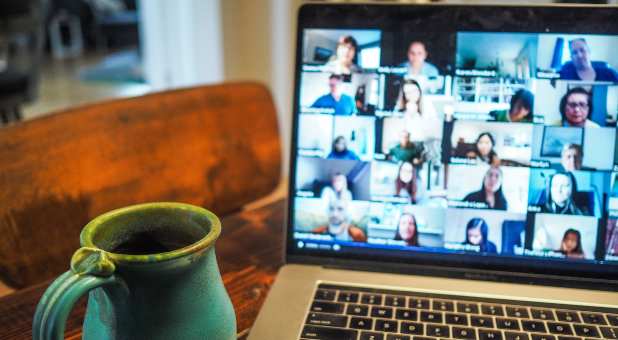The Dangerous Way Zoom Is Shaping the Face of Ministry
With the dramatic rise of the use of Zoom and other online tools, worldwide concern is being expressed for children and their inability to relate without the daily relationships of friends, teachers and others. This has now translated into the corporate world as more and more people experience the other side of the new system and its cutting-off from society, causing a new set of problems growing out of the isolation that has become widespread.
Reformation leader Martin Luther explained his personal secret: “If I fail to spend two hours in prayer each morning, the devil gets the victory through the day. I have so much business I cannot get on without spending three hours daily in prayer.”
With the coronavirus pandemic and the overnight expansion of Zoom and other online communication platforms, the concept of prayer, and in particular prayer tied to a particular place and time, has taken on new meaning. More and more people have now become used to the ability to pray without having to actually meet with other believers in collective prayer at a specific place.
“Again I say to you, that if two of you agree on earth about anything they ask, it will be done for them by My Father who is in heaven. For where two or three are assembled in My name, there I am in their midst” (Matt. 18:19-20).
According to bestselling author of God, Trump and COVID-19, Stephen Strang, “In biblical terms, Christians are told they ‘wrestle not against flesh and blood, but against principalities, against powers … against spiritual wickedness in high places.'”
With schools closed and millions of people working from home, Zoom has become wildly popular. The company said 200 million people used the app on a daily basis in March, up from just 10 million in December. But that newfound popularity is bringing new scrutiny.
With the dramatic rise in online church, prayer and school, the biblical mandate of “two or three” is being reinterpreted. But despite its convenience, the concept of moving faith online is being reexamined.
After a daily prayer meeting, one participant put it this way. “When we come daily to this place to pray together, three things happen. First, we believe that Scripture is clear that where ‘two or three’ are gathered together, the presence of God comes in a way that cannot be duplicated. Second, we believe the call of Scripture that where ‘two or three’ ask anything that God hears. But also, when we gather together, we not only gather to pray for each other and the various needs of the country and others, but we pray for those where we meet for prayer, from staff to police to officials. And the third part of what we do is physically being there, in a place of significance, to pray and bring blessing and power to that place and those who are there, something we cannot do in an online call.”
Following a time of not having regular prayer meetings, one of the key staff at the venue greeted the prayer team with, “Where have you guys been? We can’t function around here without you all praying.” As the group went down to the cafeteria for a quick bite to eat, the manager chipped in with, “It’s on us—the least we can do is feed you when you pray for us all the time.” Both comments are a testimony to the importance of prayer and ministry at a physical place.
In a day of online meetings and Zoom calls, the temptation is to just move everything to the ease of online. But as Ralph Drollinger puts it in “Theological Liberalism in America,” “The Social Gospel or ‘Liberal Christianity’ or ‘Theological Liberalism’ became rooted in American culture more than a century ago as an outcome of the Modernist-Fundamentalist controversy.” This resulted in a dramatic drop in worldwide missionary activity and the near-collapse of the worldwide missionary movement. People believed God would simply take care of things without the need to physically travel overseas.
The danger of the dramatic, massive move online is the wholesale emptying of on-site and group prayer and ministry, which is already having drastic consequences. The call is for a return to the simple principle of Scripture, which clearly ties biblical prayer both to other people—”two or three”—and to a place—”where two or three are assembled in My name, there I am in their midst.” And that is something which, for all its benefits, Zoom, with its ties to the Chinese Communist Party, cannot possibly duplicate. {eoa}
Amir George is the author of Liberating Iraq and directs The World Helpline at theworldhelpline.org.
People Needed: Capitol Hill Daily Prayer 7:30 a.m./12 p.m., Hart Senate Office Building, Constitution Ave./Supreme Court entrance.
Even if you can’t come, please pause to pray at 7:30/12 and let us know at thewhitehouseprayerteam@gmail.com.




























































